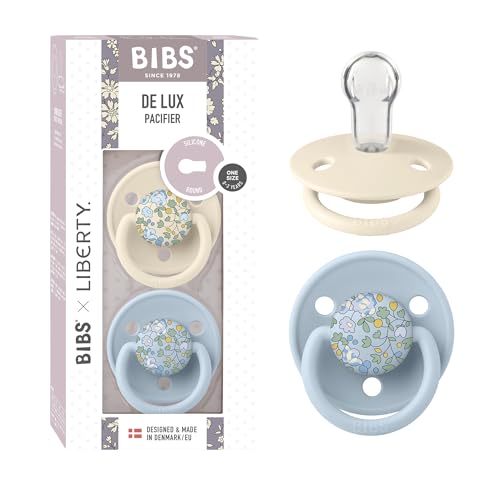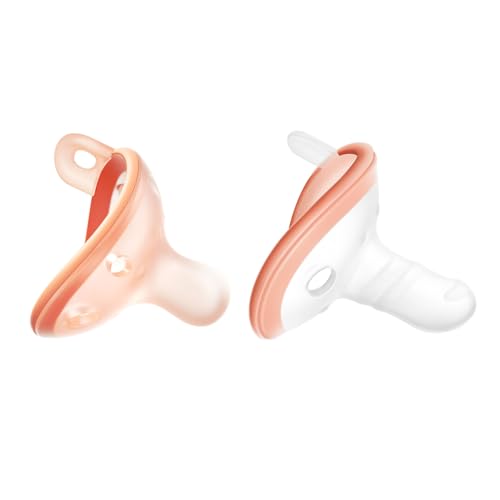Can I Use a Pacifier to Help My Baby Sleep? Bringing a new baby home is a joyous occasion, but it often comes with a significant disruption to sleep – for both baby and parents. In the quest for a peaceful night, many parents turn to pacifiers as a potential sleep aid. But is it safe? Is it effective? And when is the right time to introduce one?
This comprehensive guide dives deep into the world of pacifiers and infant sleep, offering evidence-based insights to help you make informed decisions for your little one.
The Allure of the Pacifier: Why Babies Love Them
Babies have a natural sucking reflex. This reflex is not just for feeding; it also provides comfort and a sense of security. Pacifiers can satisfy this need, helping to soothe a fussy baby and potentially promote sleep.
The Comfort Factor
Sucking on a pacifier can be incredibly calming for a baby. It can help them relax, especially when they are feeling anxious or overstimulated. This is because sucking releases endorphins, which have a natural pain-relieving and mood-boosting effect.
Reducing Crying
A pacifier can be a lifesaver when your baby is crying inconsolably. It can provide a distraction and help them to self-soothe, reducing the amount of time they spend crying.
The Potential Benefits of Pacifiers for Sleep
Beyond simple comfort, pacifiers have been linked to some significant benefits related to infant sleep and well-being.
SIDS Reduction
One of the most compelling reasons parents consider pacifiers is the potential to reduce the risk of Sudden Infant Death Syndrome (SIDS). Several studies have shown a correlation between pacifier use during sleep and a lower incidence of SIDS.(BabyCenter) The exact mechanism isn’t fully understood, but it’s believed that pacifiers may help babies sleep lighter or improve arousal from sleep, preventing them from slipping into a deep, potentially dangerous sleep state.(familydoctor.org)
Easier Sleep Transitions
Pacifiers can be particularly helpful during sleep transitions. When a baby stirs or wakes up slightly, the pacifier can provide enough comfort to help them drift back to sleep without fully waking up.
Navigating the Downsides: Potential Risks and Concerns
While pacifiers offer several potential benefits, it’s crucial to be aware of the potential drawbacks.
Nipple Confusion
For breastfeeding mothers, the timing of pacifier introduction is critical. Introducing a pacifier too early, before breastfeeding is well-established (typically around 3-4 weeks), can lead to nipple confusion.(Sleep Foundation) , (HeadStart.gov), (Baby-Friendly USA) This can make it difficult for the baby to latch onto the breast properly, potentially affecting milk supply.
Dependency
Babies can become very attached to their pacifiers, leading to dependency. This can be problematic when the pacifier falls out of their mouth during the night, causing them to wake up and cry.(Mayo Clinic) Parents may find themselves constantly replacing the pacifier throughout the night.
Increased Risk of Ear Infections
Some studies have linked pacifier use to a slightly increased risk of middle ear infections, particularly in babies older than six months.(WebMD) , (Mayo Clinic) This is because sucking on a pacifier can cause the tubes in the ears to open more than they should, allowing bacteria to enter.
Dental Problems
Prolonged pacifier use, especially beyond the age of two, can lead to dental problems, such as misaligned teeth or changes in the shape of the mouth.(BabyCenter) , (Cleveland Clinic Health Essentials)
Safe Pacifier Practices: Minimizing the Risks
If you choose to use a pacifier, it’s essential to follow safe practices to minimize potential risks.
Timing is Key
As mentioned earlier, wait until breastfeeding is well-established before introducing a pacifier. This typically takes around 3-4 weeks.(Sleep Foundation), (HeadStart.gov), (Baby-Friendly USA), (Stanford Medicine Children’s Health)
Cleanliness Matters
Regularly clean and sterilize pacifiers, especially when your baby is very young. As they get older, you can clean them with soap and water.
Use the Right Size and Type
Choose a pacifier that is the appropriate size for your baby’s age. Replace pacifiers often and watch for signs of deterioration, such as cracks or tears.(Mayo Clinic)### Avoid Attaching Pacifiers to Cribs or Clothing with Long Strings
These can pose a strangulation hazard. Use pacifier clips with short, secure straps.
Don’t Force It
Never force a baby to take a pacifier. If they spit it out, don’t keep putting it back in their mouth. Let them decide whether or not they want to use it.(HeadStart.gov)
Wean Gradually
When it’s time to wean your child off the pacifier, do it gradually. Start by limiting pacifier use during the day and then gradually reduce its use at night.
Making the Right Choice for Your Baby
Ultimately, the decision of whether or not to use a pacifier is a personal one. Weigh the potential benefits against the potential risks, and consider your own parenting style and your baby’s individual needs. If you’re breastfeeding, consult with a lactation consultant or your pediatrician to determine the best time to introduce a pacifier.
Remember, there’s no one-size-fits-all answer. What works for one baby may not work for another. Be patient, observant, and trust your instincts.
Conclusion:
Pacifiers can be a useful tool for promoting sleep and soothing babies, but they are not without potential drawbacks. By understanding the risks and benefits and following safe practices, you can make an informed decision about whether or not a pacifier is right for your family.
It’s important to remember that pacifier use is a personal choice, and what works best will vary from baby to baby.
FAQs About Pacifiers and Baby Sleep
It’s generally recommended to wait until breastfeeding is well-established, usually around 3-4 weeks of age, to avoid nipple confusion.(Sleep Foundation) , (HeadStart.gov), (Baby-Friendly USA) , (Stanford Medicine Children’s Health)
Limit pacifier use to sleep times or when your baby is particularly fussy. Avoid using it as a first resort every time your baby cries.
Yes, it is generally considered safe for babies to sleep with pacifiers, and it may even reduce the risk of SIDS.(BabyCenter), (familydoctor.org) However, be aware that the pacifier may fall out, causing your baby to wake up.
Sterilize pacifiers regularly, especially when your baby is young. As they get older, wash them with soap and water.
It’s generally recommended to wean your child off the pacifier between the ages of 2 and 4 to avoid potential dental problems.
References:
- (Sleep Foundation) https://www.sleepfoundation.org/baby-sleep/can-baby-sleep-with-pacifier
- (BabyCenter) https://www.babycenter.com/baby/crying-colic/is-it-okay-to-let-my-baby-use-her-pacifier-at-night_2062
- (familydoctor.org) https://familydoctor.org/pacifiers-benefits-and-risks/
- (Mayo Clinic) https://www.mayoclinic.org/healthy-lifestyle/infant-and-toddler-health/in-depth/pacifiers/art-20048140
- (WebMD) https://www.webmd.com/baby/pros-and-cons-of-using-a-pacifier
- (BabyCenter) https://www.babycenter.com/baby/crying-colic/pacifiers-pros-cons-and-smart-ways-to-use-them_128
- (Cleveland Clinic Health Essentials) https://health.clevelandclinic.org/baby-pacifier-pros-and-cons
- (HeadStart.gov) https://headstart.gov/oral-health/brush-oral-health/using-pacifiers-safely
- (Stanford Medicine Children’s Health) https://www.stanfordchildrens.org/en/topic/default?id=how-to-use-a-pacifier-1-981
- (Baby-Friendly USA) https://www.babyfriendlyusa.org/for-facilities/practice-guidelines/pacifiers-and-safe-sleep/
I’m Cris Coelho, and motherhood has transformed my life!
As a speech therapist and early childhood educator, I’ve always been passionate about child development. But it was becoming a mother that truly opened my eyes to the real challenges and joys of this journey.
Here at Materníssima, I share everything I’ve learned — blending professional knowledge, real-life experience, and a heartfelt touch.
You’re very welcome here! 💕






